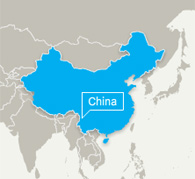Gay and bisexual men account for around one in every three new cases of HIV in China, according to an UN report citing official statistics released by China's Ministry of Health. However, according to government figures, less than half of the MSM population has access to HIV testing services and less than 15% of HIV-positive men who have sex with men (MSM) who need treatment are receiving it.

Approximately 5% of men who have sex with men in China are living with HIV – 88 times higher than the national HIV prevalence of 0.057%. In the city of Chengdu, more than 10% of the MSM population is living with HIV. Across China, HIV prevalence is generally higher in cities and urban areas, reaching almost 20% in some south-western cities.
Government officials, civil society and UN representatives met a workshop held in Chengdu, China, last Thursday, July 9, and discussed a new five-year strategy that calls for a "dramatic scale-up in the coverage of HIV prevention and treatment for the MSM population" in Chengdu and promotes the participation of community-based organisations in the city’s response to HIV. Participants included senior officials from China’s Ministry of Health, government officials from Sichuan Provincial Health Bureau, representatives from civil society and Michel Sidibé, Executive Director of the Joint United Nations Programme on HIV/AIDS (UNAIDS).
“Cities have a critical role to play in the AIDS response,” said Mr Yang Xiaoguang, Director of Chengdu Health Bureau, speaking at the workshop.
“By working to build a strong, multi-sectoral response in Chengdu, with meaningful community participation, we can scale up coverage of prevention, treatment and care services among MSM and halt the spread of HIV in our city,” he added.
Tong Ge, Coordinator of China’s MSM Health Forum and a participant in the Chengdu workshop, noted the importance of ensuring strong cooperation between government and civil society. “By building on the experiences of cities like Chengdu, which already have well developed AIDS responses, we can help to promote multi-sectoral collaboration on an equal, orderly basis and strengthen the response to HIV nationwide,” said Mr Tong. “The next step will be to implement similar strategies in other cities nationwide,” he added.
